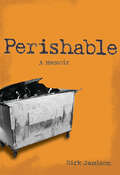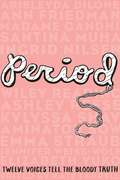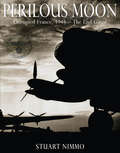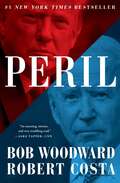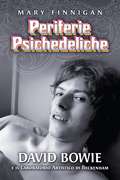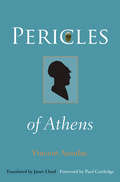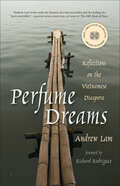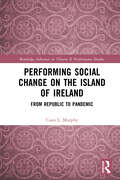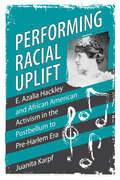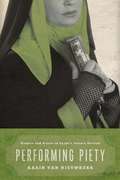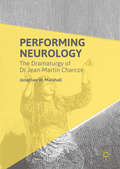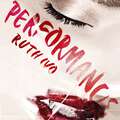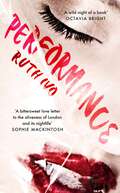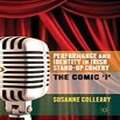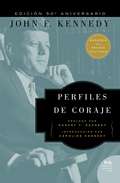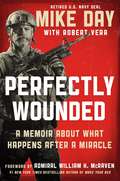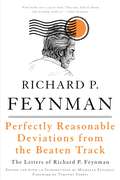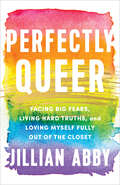- Table View
- List View
Periyar E. Ve.Ra
by Aru. AzhagappanA Monograph in Tamil on E. Ve.Ra [Erode Vankattanaicker Ramasamy] Periyar who is popularly known as "Thanthai Periyar" in Tamilnadu, South India. This book enlightens on his role in Self-respect and Rationalization Movements, projects the multifaceted leader as a Freedom Fighter, Revolutionist, Atheist, Journalist, Crusader of Caste eradication and Woman's Liberation and hails his contribution to Language, Literature and Culture.
Perishable: A Memoir
by Dirk JamisonFascinatingly disturbing, this memoir chronicles seven years in the life of a distinctly unordinary American family. In 1973, Dirk Jamison's father started having a midlife crisis that never ended, and after purposefully losing his construction job, he moved his family to a ski resort and started feeding them from dumpsters in an effort to reject money and all its trappings. They were never homeless, never desperately poor, but they lived on garbage. While Jamison struggled with adolescence, he faced a father who valued freedom more than anything, an overweight Mormon mother, and a cruel sister who delighted in physical abuse. Hilarious and horrifying, this heartbreaking account tells the strange story of the anti-American dream.
Period: Twelve Voices Tell the Bloody Truth
by Kate Farrell Various AuthorsPeriods enter the spotlight in this essay collection that raises a variety of voices on a topic long shrouded in shame and secrecy.In this collection, writers of various ages and across racial, cultural, and gender identities share stories about the period. Each of our twelve authors brings an individual perspective and sensibility. They write about homeless periods, nonexistent periods, male periods, political periods, and more. Told with warmth and humor, these essays celebrate all kinds of period experiences. Periods are a fact of life. It's time to talk about them.
Perilous Moon: Occupied France, 1944—The End Game
by Stuart Nimmo&“A volume that&’s not quite like anything else: the story of [the author&’s] father and the Nazi air ace who shot him out of the sky over Occupied France&” (Open Letters Monthly). Perilous Moon is a lavishly illustrated book that observes Occupied France during World War II through the eyes of British bomber pilot Neil Nimmo and newly discovered period photographs. Shot down by Luftwaffe night fighter pilot Helmut Bergmann, Nimmo and his crew were the German&’s sixth of seven victims in forty-six minutes. With seven wrecked Lancasters and thirty-eight Allied airmen killed, Bergmann had singlehandedly turned what should have been a relatively simple RAF raid into a life-long nightmare. With barely time to parachute from Q-Queenie, his stricken Lancaster, Neil Nimmo&’s unholy adventure had only just begun. Unusually, Perilous Moon follows both pilots, Nimmo and Bergmann, through the war after that April night, and continues to observe them as the Occupation of France comes to a sticky end. In the late 1980s, Neil Nimmo passed awat, but in Perilous Moon, his son Stuart Nimmo, a Paris-based documentary maker, closely chronicles the period with over two hundred original, previously hidden photographs. This unusual, fascinating book cuts through the fog that shrouded the Occupation and which continued to linger for decades to come. &“A masterwork of rare images and gripping narrative.&” —Mort Rosenbloom, former editor of The International Herald Tribune &“The detail in the book, including scores of photos and maps, is remarkable.&” —The Huffington Post &“A special volume among the many about the war.&” —The Columbus Dispatch
Peril: Fear, Rage, And Peril
by Bob Woodward Robert CostaThe transition from President Donald J. Trump to President Joseph R. Biden Jr. stands as one of the most dangerous periods in American history.But as #1 internationally bestselling author Bob Woodward and acclaimed reporter Robert Costa reveal for the first time, it was far more than just a domestic political crisis. Woodward and Costa interviewed more than 200 people at the center of the turmoil, resulting in more than 6,000 pages of transcripts—and a spellbinding and definitive portrait of a nation on the brink. This classic study of Washington takes readers deep inside the Trump White House, the Biden White House, the 2020 campaign, and the Pentagon and Congress, with eyewitness accounts of what really happened. Intimate scenes are supplemented with never-before-seen material from secret orders, transcripts of confidential calls, diaries, emails, meeting notes and other personal and government records, making Peril an unparalleled history. It is also the first inside look at Biden&’s presidency as he began his presidency facing the challenges of a lifetime: the continuing deadly pandemic and millions of Americans facing soul-crushing economic pain, all the while navigating a bitter and disabling partisan divide, a world rife with threats, and the hovering, dark shadow of the former president.
Periferie Psichedeliche
by Andrea Giampaoli Mary FinniganDavid Bowie ha ispirato decine di biografie sul suo genio musicale, ma nessuna mai così ricca di particolari - e di foto inedite - come quella degli esordi dell’artista nella periferia londinese raccontanti dalla giornalista Mary Finnigan in Psychedelic Suburbia – David Bowie and The Beckenham Arts Lab, pubblicato da Jorvik Press . É la storia di un giovanissimo Bowie, ancora sconosciuto, in cerca di ingaggi per concerti nei club di Londra. Mary Finnigan racconta di averlo accolto nella sua casa nel quartiere londinese di Beckenham, sostenendolo economicamente e di esserne divenuta la sua amante. Insieme fondarono un folk club al pub Three Tuns di Beckenham, organizzando riunioni settimanali alle quali man mano partecipavano sempre più persone tra poeti, studenti di cinema e altri creativi. Il club divenne un vero e proprio laboratorio artistico, The Beckenham Arts Lab, tra arti visive, teatro, poesia e musica, una Factory proprio come quella che stava creando Andy Warhol a New York. Il tutto culminerà nel Free Festival del 1696, evento che Bowie canterà nella famosa canzone "Memory of a Free Festival". Traduzione a cura di Andrea Giampaoli
Pericles of Athens and the Birth of Democracy
by Donald CaganEmphasizes his importance in the development of Athens.
Pericles of Athens
by Vincent AzoulayThe definitive biography of the legendary "first citizen of Athens"Pericles has the rare distinction of giving his name to an entire period of history, embodying what has often been taken as the golden age of the ancient Greek world. "Periclean" Athens witnessed tumultuous political and military events, and achievements of the highest order in philosophy, drama, poetry, oratory, and architecture. Pericles of Athens is the first book in decades to reassess the life and legacy of one of the greatest generals, orators, and statesmen of the classical world. In this compelling critical biography, Vincent Azoulay takes a fresh look at both the classical and modern reception of Pericles, recognizing his achievements as well as his failings. From Thucydides and Plutarch to Voltaire and Hegel, ancient and modern authors have questioned Pericles’s relationship with democracy and Athenian society. This is the enigma that Azoulay investigates in this groundbreaking book. Pericles of Athens offers a balanced look at the complex life and afterlife of the legendary "first citizen of Athens."
Pericles and the Conquest of History
by Loren J. Samons IIAs the most famous and important political leader in Athenian history, Pericles has featured prominently in descriptions and analysis of Athenian democracy from antiquity to the present day. Although contemporary historians have tended to treat him as representative of values like liberty and equality, Loren J. Samons, II demonstrates that the quest to make Athens the preeminent power in Greece served as the central theme of Pericles' career. More nationalist than humanist and less rationalist than populist, Pericles' vision for Athens rested on the establishment of an Athenian reputation for military success and the citizens' willingness to sacrifice in the service of this goal. Despite his own aristocratic (if checkered) ancestry, Pericles offered the common and collective Athenian people the kind of fame previously available only to heroes and nobleman, a goal made all the more attractive because of the Athenians' defensiveness about Athens' lackluster early history.
Pericles
by Thomas R. MartinPericles was the most famous leader of the most famous ancient Greek democracy - and also the most controversial in his own time and ever since. Was he a brutal imperialist ready to oppress other Greeks, or a clear-eyed defender of Athens' need for power to survive in a relentlessly hostile world? How did his intellectual training in ideas that many Athenians regarded as dangerous make him the most persuasive leader Athenian democracy ever knew? Why was his personal lifestyle so idiosyncratic? How should we evaluate his responsibility for the suffering and loss of the Peloponnesian War? Thomas R. Martin's unique emphasis on the effect on Pericles of his family's notorious history, his youthful experiences as a wartime refugee, and his unusual education reveals a brilliant politician whose hyper-rationality could not, in the end, protect him or his community from tragedy.
Perfume Dreams: Reflections on the Vietnamese Diaspora
by Andrew Lam“Much will be made—and rightly so—of the eloquent commentary [Lam’s] essays provide on Vietnam and the Vietnamese . . . a fascinating and important book.” —Robert Olen Butler, Pulitzer Prize–winning authorA PEN American Beyond Margins Award winnerIn his long-overdue first collection of essays, noted journalist and NPR commentator Andrew Lam explores his lifelong struggle for identity as a Viet Kieu, or a Vietnamese national living abroad. At age eleven, Lam, the son of a South Vietnamese general, came to California on the eve of the fall of Saigon to communist forces. He traded his Vietnamese name for a more American one and immersed himself in the allure of the American dream: something not clearly defined for him or his family. Reflecting on the meanings of the Vietnam War to the Vietnamese people themselves—particularly to those in exile—Lam picks with searing honesty at the roots of his doubleness and his parents’ longing for a homeland that no longer exists.“Lam shatters the assumptions of readers who have encountered the Vietnam experience only through American pop culture . . . He writes with the delicacy and intensity of a poet.” —Los Angeles Times Book Review“Andrew Lam writes with the honesty of a true journalist and the feeling of a born storyteller. On his many journeys between Vietnam and the U.S., he sees first-hand the global consequences of war. Perfume Dreams is a meaningful book for our times.” —Maxine Hong Kingston, national bestselling author of The Woman Warrior“Lam’s insights into Asian American life are reflected in candid, witty anecdotes that reveal much about the difficulties of living in two cultures.” —Audrey Magazine
Performing Social Change on the Island of Ireland: From Republic to Pandemic (Routledge Advances in Theatre & Performance Studies)
by Ciara L. MurphyThis book examines the relationship between moments of significant social change on the island of Ireland and performance practice during the twentieth and twenty-first centuries. It examines how moments of significant change influence not only the content of performance practice but also the form and function of theatre production and reception. This book investigates how the Troubles and subsequent Peace Process, Second-Wave Feminism, the Celtic Tiger and neoliberalism, social revolution, and the COVID-19 pandemic impacts the form and function of performance practice across the island of Ireland. Although these forms of theatre and performance making refer to varied and distinct lineages of practice internationally, there are key parallels that compel a study of their inter-relationality in a specific Irish context This book explores how the performance of Ireland illuminates histories and stories that are on the margins, illuminating the lived realities of everyday life through the presentation of moments of violence, oppression, and trauma as something that is as important as the larger narratives often ascribed to nationhood. This book asks how performance practice engages with and informs moments of major social change on the island of Ireland through the distinct yet intersecting lenses of place, performance form, and social context over the course of almost a century of Irish theatre and performance practice.
Performing Racial Uplift: E. Azalia Hackley and African American Activism in the Postbellum to Pre-Harlem Era (Margaret Walker Alexander Series in African American Studies)
by Juanita Karpf2023 CHOICE Outstanding Academic TitleIn Performing Racial Uplift: E. Azalia Hackley and African American Activism in the Postbellum to Pre-Harlem Era, Juanita Karpf rediscovers the career of Black activist E. Azalia Hackley (1867–1922), a concert artist, nationally famous music teacher, and charismatic lecturer. Growing up in Black Detroit, she began touring as a pianist and soprano soloist while only in her teens. By the late 1910s, she had toured coast-to-coast, earning glowing reviews. Her concert repertoire consisted of an innovative blend of spirituals, popular ballads, virtuosic showstoppers, and classical pieces. She also taught music while on tour and visited several hundred Black schools, churches, and communities during her career. She traveled overseas and, in London and Paris, studied singing with William Shakespeare and Jean de Reszke—two of the classical music world’s most renowned teachers. Her acceptance into these famous studios confirmed her extraordinary musicianship, a “first” for an African American singer. She founded the Normal Vocal Institute in Chicago, the first music school founded by a Black performer to offer teacher training to aspiring African American musicians. Hackley’s activist philosophy was unique. Unlike most activists of her era, she did not align herself unequivocally with either Booker T. Washington or W. E. B. Du Bois. Instead, she created her own mediatory philosophical approach. To carry out her agenda, she harnessed such strategies as giving music lessons to large audiences and delivering lectures on the ecumenical religious movement known as New Thought. In this book, Karpf reclaims Hackley's legacy and details the talent, energy, determination, and unprecedented worldview she brought to the cause of racial uplift.
Performing Piety: Singers and Actors in Egypt's Islamic Revival
by Karin Van NieuwkerkIn the 1980s, Egypt witnessed a growing revival of religiosity among large sectors of the population, including artists. Many pious stars retired from art, "repented" from "sinful" activities, and dedicated themselves to worship, preaching, and charity. Their public conversions were influential in spreading piety to the Egyptian upper class during the 1990s, which in turn enabled the development of pious markets for leisure and art, thus facilitating the return of artists as veiled actresses or religiously committed performers. Revisiting the story she began in "A Trade like Any Other": Female Singers and Dancers in Egypt, Karin van Nieuwkerk draws on extensive fieldwork among performers to offer a unique history of the religious revival in Egypt through the lens of the performing arts. She highlights the narratives of celebrities who retired in the 1980s and early 1990s, including their spiritual journeys and their influence on the "pietization" of their fans, among whom are the wealthy, relatively secular, strata of Egyptian society. Van Nieuwkerk then turns to the emergence of a polemic public sphere in which secularists and Islamists debated Islam, art, and gender in the 1990s. Finally, she analyzes the Islamist project of "art with a mission" and the development of Islamic aesthetics, questioning whether the outcome has been to Islamize popular art or rather to popularize Islam. The result is an intimate thirty-year history of two spheres that have tremendous importance for Egypt--art production and piety.
Performing Neurology
by Jonathan W. MarshallThis text provides a study of Jean-Martin Charcot, a founding figure in the history of neurology as a discipline and a colleague of Sigmund Freud. It argues that Charcot's diagnostic and pedagogic models, explaining both how disease is recognized and described and how to teach the act of neurological diagnosis, should be considered through a theatrical lens. Considering the constitution of the living, moving body in terms of performance, Charcot created a situation whereby the line between deceptive acting and real pathology, scientific accuracy and creative falsehood, and indeed between health and unhealth, becomes blurred. The physician becomes a medical subject in his or her own display, transforming medicine into a potentially destabilizing, even grand guignolesque, discourse. Offering a unique insight into Charcot's work, his concepts and his methods, this text represents a unique and interdisciplinary analysis cutting across the fields of art and neurology.
Performing Anti-Slavery
by Gay Gibson CimaIn Performing Anti-Slavery, Gay Gibson Cima reimagines the connection between the self and the other within activist performance, providing fascinating new insights into women's nineteenth-century reform efforts, revising the history of abolition, and illuminating an affective repertoire that haunts both present-day theatrical stages and anti-trafficking organizations. Cima argues that black and white American women in the nineteenth-century abolitionist movement transformed mainstream performance practices into successful activism. In family circles, literary associations, religious gatherings, and transatlantic anti-slavery societies, women debated activist performance strategies across racial and religious differences: they staged abolitionist dialogues, recited anti-slavery poems, gave speeches, shared narratives, and published essays. Drawing on liberal religious traditions as well as the Eastern notion of transmigration, Elizabeth Chandler, Sarah Forten, Maria W. Stewart, Sarah Douglass, Lucretia Mott, Ellen Craft and others forged activist pathways that reverberate to this day.
Performance: An electrifying memoir from the dark heart of London's Soho
by Ruth Ivo'Stunning . . . a love letter to the aliveness of London and its nightlife' SOPHIE MACKINTOSH'A wild night of a book' OCTAVIA BRIGHTAs 'Ruby', Ruth Ivo was a successful burlesque performer, living in blissful bohemian squalor on a decommissioned military boat and spending her evenings unfolding from a Fabergé egg in various London clubs. Her life changes when she is asked to become show director at 'The Club', a place as secretive as it is notorious. Before long, she's trawling Soho back streets for props and knocking back shots with movie stars and billionaires. But as her nights unravel in a maelstrom of glamour and chaos behind the scenes, she feels her grasp on reality slipping through her fingers, and her soul wrung out by decadence. Under pressure to produce shows each more shocking than the last, she watches the performers under her care contort themselves before baying crowds. When a devastating event leaves her unmoored, Ruby has to wonder if she's sold her soul to the devil . . . or become him. Performance is a visceral and exquisitely written portrait of a place that has come to embody the excesses of late capitalism; of tumbling willingly down the rabbit hole, only to lose yourself in the dark.______'Performance is theatrical, immersive and utterly heartbreaking. An astonishing debut' CHRISTIE WATSON'A story this addictive, it's hard not to consume it in one go' RHYANNON STYLES'I devoured this book in two days, all of its twisting corners and dark alleyways. I know Soho like the back of my hand and this brought that lost world back in vivid colours' JODIE HARSH
Performance: An electrifying memoir from the dark heart of London's Soho
by Ruth Ivo'Stunning . . . a love letter to the aliveness of London and its nightlife' SOPHIE MACKINTOSH'A wild night of a book' OCTAVIA BRIGHTAs 'Ruby', Ruth Ivo was a successful burlesque performer, living in blissful bohemian squalor on a decommissioned military boat and spending her evenings unfolding from a Fabergé egg in various London clubs. Her life changes when she is asked to become show director at 'The Club', a place as secretive as it is notorious. Before long, she's trawling Soho back streets for props and knocking back shots with movie stars and billionaires. But as her nights unravel in a maelstrom of glamour and chaos behind the scenes, she feels her grasp on reality slipping through her fingers, and her soul wrung out by decadence. Under pressure to produce shows each more shocking than the last, she watches the performers under her care contort themselves before baying crowds. When a devastating event leaves her unmoored, Ruby has to wonder if she's sold her soul to the devil . . . or become him. Performance is a visceral and exquisitely written portrait of a place that has come to embody the excesses of late capitalism; of tumbling willingly down the rabbit hole, only to lose yourself in the dark.______'Performance is theatrical, immersive and utterly heartbreaking. An astonishing debut' CHRISTIE WATSON'A story this addictive, it's hard not to consume it in one go' RHYANNON STYLES'I devoured this book in two days, all of its twisting corners and dark alleyways. I know Soho like the back of my hand and this brought that lost world back in vivid colours' JODIE HARSH
Performance and Identity in the Classical World
by Anne DuncanActors in the classical world were often viewed as frauds and impostors, capable of deliberately fabricating their identities. Conversely, they were sometimes viewed as possessed by the characters that they played, or as merely playing themselves onstage. Numerous sources reveal an uneasy fascination with actors and acting, from the writings of elite intellectuals (philosophers, orators, biographers, historians) to the abundant theatrical anecdotes that can be read as a body of "popular performance theory. " This study examines these sources, along with dramatic texts and addresses the issue of impersonation, from the late fifth century BCE to the early Roman Empire.
Performance and Identity in Irish Stand-Up Comedy
by Susanne CollearyPerformance and Identity in Irish Stand-Up Comedy examines the comic tradition of stand-up in and from modern-day Ireland. Using critical analyses of comedians including Tommy Tiernan, Dylan Moran and Maeve Higgins, Susanne Colleary's engaging new book explores the role of stand-up in contemporary culture and examines the role of the staged comic self in performance. This book is suitable for students and scholars of international performance, and general readers interested in the interplay between comedy and society in contemporary cultural thought.
Perfiles de Coraje
by John F. Kennedy«Este es un libro acerca de la virtud más admirable de todas las virtudes humanas: el valor. Ernest Hemingway la definió como “gracia bajo presión”. Y estos son los relatos sobre las presiones que experimentaron ocho Senadores de Estados Unidos y la gracia con la cual las enfrentaron». —John F. Kennedy Durante los años 1954 y 1955, el entonces Senador de Estados Unidos, John F. Kennedy, escogió a ocho de sus colegas históricos para presentar sus perfiles, destacados por sus actos de impresionante integridad ante una oposición abrumadora. Entre estos héroes se encuentran John Quincy Adams, Daniel Webster, Thomas Hart Benton y Robert A. Taft. Este libro recibió el Premio Pulitzer en 1957, y ha vuelto al mercado en esta nueva edición en español, que incluye una introducción escrita por Caroline Kennedy, además del prólogo para la edición conmemorativa escrito por Robert Kennedy, lanzada en 1964, resuena con lecciones perdurables para todos los tiempos sobre la más apreciada de las virtudes, y es una poderosa remembranza de la fortaleza del espíritu humano. Como afirma Robert Kennedy en el prólogo, este es «no solo un conjunto de historias del pasado, sino también una conexión de esperanza y confianza para el futuro. Lo que suceda en la nación, y en el mundo, depende de lo que nosotros hagamos con lo que otros nos han dejado».
Perfectly You: Embracing the Power of Being Real
by Mariana AtencioIn this much-needed book, which is part self-help and part autobiography, award-winning correspondent Mariana Atencio digs into what makes each of us special and the ways in which we can become a force for good in a broken world.As a bilingual correspondent for NBC News, Fusion TV, and Univision, Mariana holds a unique perspective—having immigrated from Venezuela to America as a young adult, having overcome challenges to graduate from Columbia University and eventually become a national news correspondent, and having seen firsthand the humanity that is ever so present in the midst of both adversity and opportunity.Mariana’s story is the powerful, inspiring story of life in the United States as an immigrant. Yet it is at its core a human story. It is all of our stories, and it is a call to every man, woman, and child to unlock the magic of their potential and begin to thrive.The media screens of today perpetuate stereotypes, but what would happen if instead of comparing ourselves and falling short, we compared ourselves and celebrated our uniqueness? What would happen if we believed in our worth and embraced what makes us different? And what if we truly saw those around us as neighbors and not merely adversaries to our particular group or station?The days of doubt and division must end. It starts with authenticity, persistence, and understanding what truly makes you special.
Perfectly Wounded: A Memoir About What Happens After a Miracle
by Mike DayThe incredible true story of former Navy SEAL Mike Day, who survived being shot twenty-seven times while deployed in Iraq.On the night of April 6, 2007, in Iraq's Anbar Province, Senior Chief Mike Day, his team of Navy SEALs, and a group of Iraqi scouts were on the hunt for a high-level al Qaeda cell. Day was the first to enter a 12x12 room where four terrorist leaders were waiting in ambush. When the gunfight was over, he took out all four terrorists in the room, but not before being shot twenty-seven times and hit with grenade shrapnel. Miraculously, Day cleared the rest of the house and rescued six women and children before walking out on his own to an awaiting helicopter, which flew him to safety.While in the hospital, the Navy SEAL lost fifty-five pounds in two weeks. It took almost two years for Day to physically recover from his injuries, although he still deals with pain. Like so many veterans, doctors diagnosed Day with Post Traumatic Stress Disorder and Traumatic Brain Injury -- the invisible wounds of war.Perfectly Wounded is the remarkable story of an American hero whose incredible survival defies explanation, and whose blessed life of service continues in the face of unimaginable odds. p.p1 {margin: 0.0px 0.0px 0.0px 0.0px; font: 12.0px Arial} p.p2 {margin: 0.0px 0.0px 0.0px 0.0px; text-indent: 36.0px; font: 12.0px Arial}
Perfectly Reasonable Deviations From the Beaten Track: The Letters of Richard P. Feynman
by Richard P. FeynmanA Nobel Prize-winning physicist, a loving husband and father, an enthusiastic teacher, a surprisingly accomplished bongo player, and a genius of the highest caliber---Richard P. Feynman was all these and more. Perfectly Reasonable Deviations From the Beaten Track--collecting over forty years' worth of Feynman's letters--offers an unprecedented look at the writer and thinker whose scientific mind and lust for life made him a legend in his own time. Containing missives to and from such scientific luminaries as Victor Weisskopf, Stephen Wolfram, James Watson, and Edward Teller, as well as a remarkable selection of letters to and from fans, students, family, and people from around the world eager for Feynman's advice and counsel, Perfectly Reasonable Deviations From the Beaten Track not only illuminates the personal relationships that underwrote the key developments in modern science, but also forms the most intimate look at Feynman yet available. Feynman was a man many felt close to but few really knew, and this collection reveals the full wisdom and private passion of a personality that captivated everyone it touched. Perfectly Reasonable Deviations From the Beaten Track is an eloquent testimony to the virtue of approaching the world with an inquiring eye; it demonstrates the full extent of the Feynman legacy like never before. Edited and with additional commentary by his daughter Michelle, it's a must-read for Feynman fans everywhere, and for anyone seeking to better understand one of the towering figures--and defining personalities--of the twentieth century.
Perfectly Queer: Facing Big Fears, Living Hard Truths, and Loving Myself Fully Out of the Closet
by Jillian AbbyThis humorous, heartwarming memoir follows a wife and mother's journey of self-discovery and acceptance as she comes out as a lesbian in her late 30s.Jill had a happy, healthy 20-year relationship with her college sweetheart, two wonderful kids, and rescue cat from the Humane Society. They lived in a nice suburban home with a white picket fence and owned a small bar that was rated one of the &“Best Mom & Pop&” businesses in Tampa Bay. From the outside, everything looked perfect.Perfectly Queer takes the reader on Jillian Abby's poignant and painfully funny rollercoaster of self-discovery as she identifies and eventually accepts herself as a lesbian just before her 40th birthday. Living her new truth means leaving behind a life that, by societal standards, is nearly perfect.This is a story for anyone who is hiding a piece of themselves and wants to know if it&’s safe to be revealed. It&’s for the parent who must choose between their own happiness and the stability of their family, wondering if prioritizing themselves is selfish. It&’s for the person potentially facing a major life upheaval filled with unknowns in the future who is seeking reassurance that everything will work out just fine. It&’s a story of hope and inspiration to those who are starting or are in the middle of their journey, and an affirmation to those who have been through it to stand proudly on the other side.

